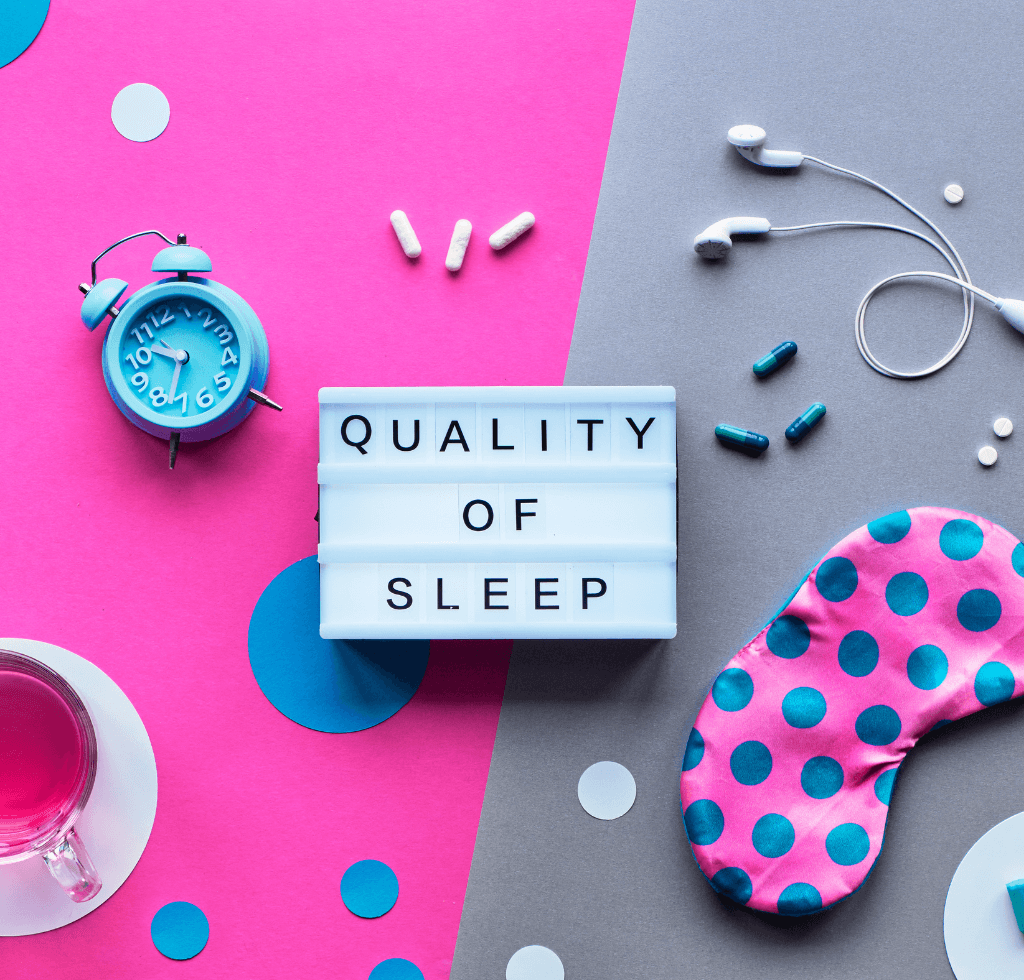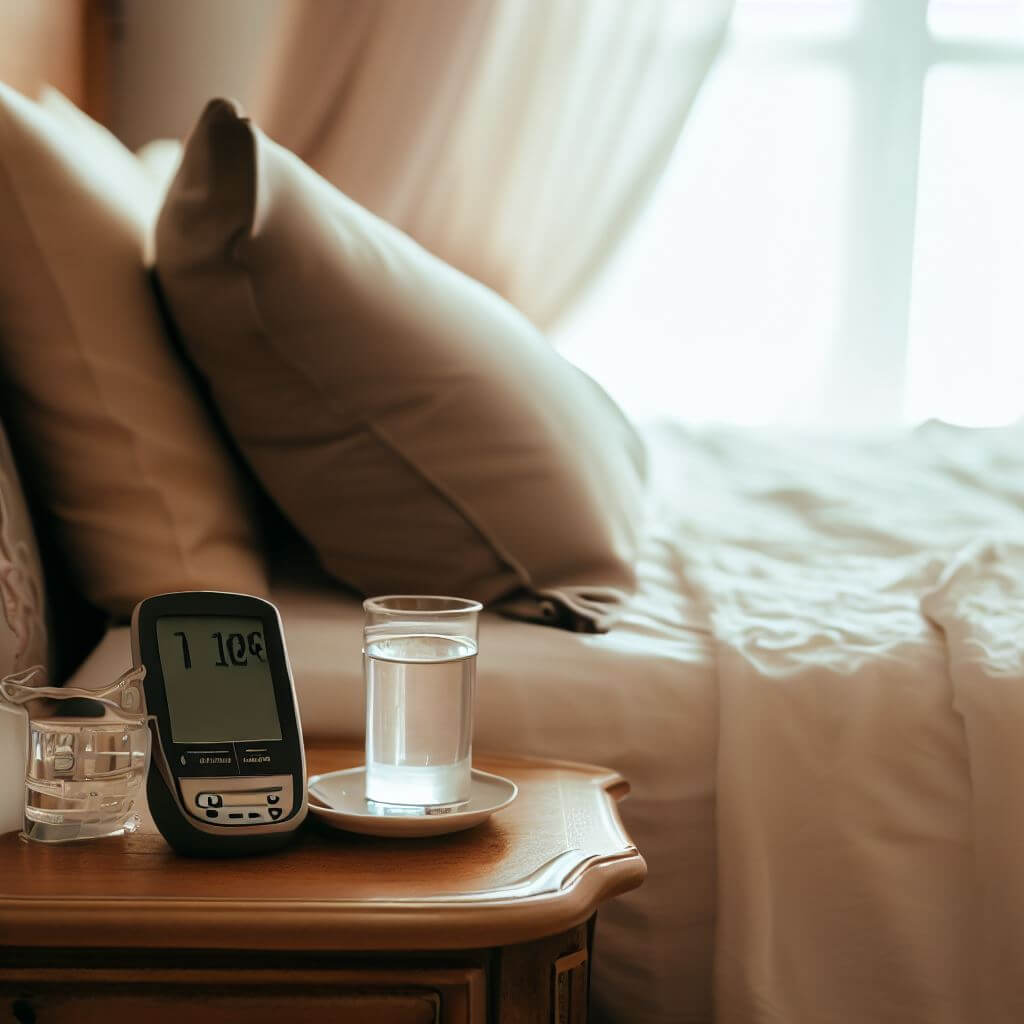The Crucial Link Between Sleep and Diabetes Management
Understanding the importance of sleep in managing diabetes is essential. Poor sleep can lead to increased stress hormones, which in turn can raise your blood sugar levels. Beyond that, lack of sleep affects your body’s insulin sensitivity, making it harder for cells to absorb glucose. When you combine the pitfalls of sleep deprivation with the intricacies of managing diabetes, it’s clear that adequate and quality sleep becomes not just a goal but a necessity. Let us dive in to managing high blood sugar at night!
The Impact of Elevated Blood Sugar on Sleep Quality
Elevated levels of blood sugar can interfere with your ability to fall asleep and stay asleep. For instance, high blood sugar can lead to symptoms like increased thirst, frequent urination, and sweating—all of which can keep you up at night. These disruptions can lead to a vicious cycle where poor sleep contributes to poor blood sugar control, which in turn leads to even poorer sleep quality. By understanding this interplay, you’re better equipped to tackle the issue head-on.

Decoding Blood Sugar Levels
What Constitutes High Blood Sugar?
In medical terms, high blood sugar is known as hyperglycemia. It’s diagnosed when the levels of glucose (sugar) in the blood are consistently higher than normal. Normal fasting blood sugar levels should range from 70 to 100 mg/dL, while those with diabetes should aim for a range between 70 and 130 mg/dL. High blood sugar can be temporary and occur during illness or stress, or it may be a recurring issue that needs ongoing management.
Recognizing the Symptoms of Elevated Blood Sugar
Being aware of the symptoms of high blood sugar is crucial for timely intervention. Some common signs include:
- Frequent urination
- Excessive thirst
- Dry mouth
- Fatigue
- Headaches
Identifying these symptoms quickly can help you take action before they escalate into more serious issues like ketoacidosis or even coma.
How Elevated Blood Sugar Affects Your Sleep
High blood sugar can significantly impact your sleep quality. Elevated glucose levels increase the need to urinate during the night, causing frequent wake-ups. Furthermore, high sugar levels make it difficult for the body to achieve the state of relaxation needed to fall and stay asleep. Even if you manage to sleep through the night, elevated blood sugar can lead to restless sleep, causing you to wake up feeling unrefreshed.
Understanding how elevated blood sugar affects your sleep is vital to taking appropriate steps to manage it effectively, thereby improving both your sleep quality and overall health.
Monitoring Blood Sugar at Night: A Comprehensive Guide
Why Nighttime Monitoring is Essential
Nighttime blood sugar monitoring is pivotal for individuals with diabetes, especially those who are prone to nocturnal fluctuations. During the night, various hormonal changes can affect blood sugar levels. The dawn phenomenon, for instance, refers to a natural rise in hormones like cortisol and growth hormone in the early morning hours, leading to elevated blood sugar. Nighttime monitoring can also identify periods of hypoglycemia, which can be equally disruptive to sleep and health.
Tools and Technologies for Monitoring
Today, there are various methods available for monitoring your blood sugar levels during nighttime hours:
- Traditional Glucose Meters: These are portable devices that measure blood sugar using a small drop of blood from a finger-prick.
- Continuous Glucose Monitors (CGMs): These systems provide real-time glucose readings throughout the day and night, offering more comprehensive data.
Choosing the right tool depends on your individual needs, the severity of your condition, and your comfort level with the technology.
Ideal Times to Check Blood Sugar
For the most accurate snapshot of your nighttime blood sugar levels:
- Check your blood sugar right before going to sleep.
- Set an alarm for a middle-of-the-night check, especially if you’ve had issues with nighttime lows or highs.
- Test your blood sugar again upon waking up in the morning.
Consistent monitoring will not only provide valuable data but also help you make necessary adjustments to your management plan.
Strategies for Managing High Blood Sugar for Restful Nights
Lifestyle Modifications for Better Blood Sugar Control
Dietary Choices
Eating balanced meals rich in nutrients can have a lasting impact on your blood sugar control. Some tips include:
- Opt for complex carbohydrates over simple sugars.
- Incorporate more fiber into your diet.
- Maintain a consistent eating schedule.
The Power of Physical Activity
Exercise is a great way to regulate blood sugar levels, but timing is key. Engaging in light exercises like walking after dinner can help lower your blood sugar before bedtime. However, avoid high-intensity workouts close to bedtime as they can temporarily raise your blood sugar.

Pharmacological Aids
Insulin Adjustments
If you rely on insulin injections, timing and dosage are critical for managing blood sugar overnight. Consult your healthcare provider to discuss any necessary adjustments to your insulin regimen.
Oral Medications
Several types of oral medications can help manage blood sugar levels:
- Metformin: Helps decrease the liver’s glucose production.
- Sulfonylureas: Stimulate the pancreas to release more insulin.
Always consult a healthcare provider for the most effective medication for your situation.
The Role of Sleep Aids and Supplements in Managing High Blood Sugar
Over-the-Counter Sleep Aids
Pros and Cons
- Pros:
- Quick solution for occasional sleeplessness
- Wide availability
- Cons:
- Potential interactions with diabetes medications
- May cause drowsiness or impair judgment the next day
Common Options and their Impact on Blood Sugar
- Antihistamines: While effective for inducing sleep, they may cause elevated blood sugar levels in some individuals.
- Melatonin: This naturally occurring hormone can help regulate sleep-wake cycles but should be used cautiously as it may affect blood sugar levels.
Natural Sleep Aids and Supplements
Herbal Teas
Chamomile, valerian root, and lavender are commonly used herbal teas that can help induce sleep. While generally considered safe, it’s always a good idea to consult with a healthcare provider, especially if you are on diabetes medication.
Magnesium Supplements
Magnesium can aid in relaxation and has been linked to better sleep quality. Some studies also suggest that it can help improve insulin sensitivity. However, too much magnesium can cause gastrointestinal issues and should be discussed with a healthcare provider.
Consulting Your Healthcare Provider
Before incorporating any new sleep aids or supplements, it’s crucial to consult your healthcare provider to ensure they won’t adversely affect your blood sugar levels or interact with other medications you may be taking.
Emergency Measures
Keep a source of fast-acting carbohydrates like glucose tablets or juice by your bedside. This can be a lifesaver if you experience hypoglycemia during the night.
Understanding the Consequences: Potential Side Effects of Treatments
The Double-Edged Sword of Lifestyle Changes
Pros and Cons of Dietary Changes
- Pros:
- Enhanced overall health
- Lowered risk of heart disease and obesity
- Sustainable long-term solution
- Cons:
- Difficult to maintain
- Requires careful meal planning
- May require an adjustment period
Pros and Cons of Exercise
- Pros:
- Improves insulin sensitivity
- Supports weight loss
- Enhances mood and mental well-being
- Cons:
- Risk of hypoglycemia if not timed correctly
- Can be physically taxing for some individuals
- May require an investment in gym memberships or equipment
The Risks and Rewards of Medication
Insulin Treatment: A Double-Edged Sword
- Pros:
- Rapid and effective blood sugar control
- Dosage can be adjusted for individual needs
- Cons:
- Risk of hypoglycemia
- Potential for weight gain
- Requires regular monitoring
Oral Medication: A Convenient Option
- Pros:
- Easy to administer
- Less invasive than injections
- Cons:
- Possible gastrointestinal side effects
- May interact with other medications
- Not suitable for everyone
The Key to Restful Nights: Preparing for a Good Night’s Sleep
The Importance of a Pre-Sleep Routine
Establishing a calming pre-sleep routine is essential for anyone but even more so for those managing high blood sugar. This could include:
- Relaxation techniques such as deep breathing or meditation
- Limiting screen time an hour before bed
- Reading a book or listening to calming music
Creating the Ideal Sleep Environment
Your sleep environment can have a profound impact on the quality of your rest. Consider these aspects:
- Room Temperature: A cooler room typically supports better sleep.
- Darkness: Limit exposure to artificial lights; consider blackout curtains or an eye mask.
- Noise: A quiet room is ideal; consider using earplugs or white noise machines if needed.
Additional Sleep Aids
While you should avoid heavy meals or caffeine close to bedtime, herbal teas like chamomile or valerian root may help relax you. A warm bath or shower can also prepare your body for sleep by slightly raising your body temperature, followed by a cooling period that signals your body it’s time to sleep.

Taking it to the Next Level: Advanced Tips
Fine-Tuning Your Diet with Nutrient Timing
Rather than just focusing on what you eat, consider when you eat certain nutrients. For example, consuming protein and healthy fats in your evening meal may slow down the absorption of carbohydrates, resulting in steadier blood sugar levels through the night.
Smart Tech for Smarter Management
If you’re comfortable with technology, consider advanced systems like artificial pancreas devices that both monitor blood sugar levels and administer insulin automatically. Though these are more complex and expensive, they offer cutting-edge management options.
Mental Health and High Blood Sugar
Stress and anxiety can directly impact your blood sugar levels. Incorporating advanced relaxation techniques like mindfulness, progressive muscle relaxation, or even biofeedback methods can help you manage stress, thereby indirectly aiding in better blood sugar control.
Trust but Verify: Expert Advice
When to Consult a Dietitian
For personalized, in-depth advice tailored to your medical history, lifestyle, and dietary preferences, a consultation with a certified dietitian specializing in diabetes care can be invaluable.
Understanding the Latest Research
Keeping up-to-date with the latest studies on diabetes management can provide new insights. Websites like the American Diabetes Association or journals like Diabetes Care publish reliable, peer-reviewed information. However, always consult healthcare providers before making significant changes to your treatment.
Second Opinions: Are They Necessary?
When considering significant changes to your medication or treatment plan, a second opinion can offer additional perspectives that could be vital for effective management. Don’t hesitate to seek advice from multiple experts, especially when considering more intensive treatments or surgical options.
With these advanced tips and expert advice, you’re not only keeping up with basic strategies for managing high blood sugar at night but are also staying ahead of the curve. These guidelines offer deeper insights and options for those who are keen on optimizing their nighttime blood sugar management.
New Dawn: Concluding Remarks
Managing high blood sugar levels at night is a complex challenge that requires a multifaceted approach. From understanding the relationship between sleep and blood sugar to employing advanced techniques, each step brings you closer to a more stable and healthier life.
In Summary:
- Monitoring blood sugar at night provides valuable data for better management.
- Lifestyle changes, although demanding, offer a holistic approach for blood sugar control.
- Medications are effective but come with their set of potential side effects.
- Advanced techniques and expert advice are available for those looking to optimize their management strategies.
Achieving restful sleep and maintaining optimal blood sugar levels are not mutually exclusive. With informed choices, careful planning, and proactive measures, you can significantly improve your sleep quality, thereby positively impacting your overall diabetes management.
Frequently Asked Questions (FAQs)
1. Can high blood sugar levels affect my sleep quality?
Yes, elevated blood sugar levels can interfere with your ability to fall asleep and stay asleep. Symptoms like increased thirst, frequent urination, and excessive sweating can disrupt your sleep.
2. How can I monitor my blood sugar levels at night?
You can either use traditional glucose meters for periodic checks or continuous glucose monitors (CGMs) for real-time tracking. The choice depends on your individual needs and comfort with the technology.
3. Is exercise recommended for better blood sugar control?
Yes, exercise is a powerful tool for regulating blood sugar levels. However, the type and timing of the exercise are crucial to avoid spikes or lows in blood sugar, especially close to bedtime.
4. Are there any natural remedies for lowering high blood sugar levels?
While some natural remedies like cinnamon and fenugreek are said to help lower blood sugar, they should not replace prescribed medications. Always consult with a healthcare provider before adding any natural supplements to your regimen.
5. What are the potential side effects of medications for managing high blood sugar?
Common side effects may include gastrointestinal issues, risk of hypoglycemia, and potential weight gain. Always consult with your healthcare provider for a full list of possible side effects tailored to your specific medication.





